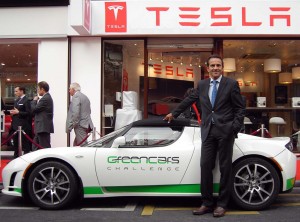There are plenty of eco-minded tour operators who’ll send you to a tree house in Costa Rica and maybe provide a bicycle for transportation. But Formula One driver Erik Comas wants to appeal to those who still like a thrill behind the wheel while doing something that’s reasonably friendly to the environment.
He’s launching a new program, called the Green Car Challenge, which will let like-minded vacationers tackle some of the world’s most scenic – and challenging — roadways while driving cars that leave little more than tire prints behind.
Comas, who raced the F1 circuit from 1991 to 1994, has acquired five Tesla Roadsters for his new company. They will be used for multi-day tours through the Swiss Alps and the French countryside.
“I love nature, but I also love cars. The good thing about the Tesla is you can still enjoy quick cars and yet be friendly with the environment,” Comas said during an interview with TheDetroitBureau.com.
While he continued racing after he retired from the Formula One circuit, Comas began a tourism business aimed at a combination of motor sport wannabes and corporate groups looking for a way to encourage team-building and bonding.
He rented out historic, street legal race and sports cars for ventures through Africa and Europe, for example. But as environmental awareness has spread, Comas notes that many companies no longer see using noisy and polluting vehicles as acceptable.
His own interest in eco-friendly motoring came slowly.
“If you asked me about electric cars 10 months ago I would have told you they belonged on a golf course,” Comas admits. But then he was approached by the California battery car start-up, Tesla Motors.
Last March, Comas became the first driver to win an event sanctioned by the Federation Internationale de l’Automobile with a totally battery-powered vehicle. His Tesla Roadster dominated the 1,000 kilometer, three-day Monte Carlo Alternative Energy Rally.
Three months later, he launched a new company, based in Lausanne, Switzerland, Called Green Cars, and began putting together the idea for what has become the Green Car Challenge.
Comas received the keys to the five new Roadsters he’ll be using in the program during the dedication of the first Tesla showroom in Paris, last week.
California-based Tesla claims 0 to 60 times of just 3.7 seconds for the Roadster. But aggressive driving will quickly cut down its rated 200-mile range on a charge. To keep participants occupied when its time to recharge, Coma’s new company will break up travel with stops at high-end restaurants, spas and hotels.
Clearly aimed at high-end tourists and business groups, Green Car Challenge will provide seminars and other activities, it says, to promote team-building and sustainability.
“The Roadster,” says Comas, “underscores that social and environmental responsibility are important messages for business executives in the 21st century.”
And potentially profitable ones, Comas apparently believes.
The Green Car Challenge costs 1,250 Swiss Francs per driver per day, about $1,300 at the current exchange rate. That includes both the use of the Roadster as well as hotel and other costs.
While he says he’d make the program available to, “10 friends who want to have a weekend together,” Comas explains that, “The number one target is corporate groups.”
Comas is by no means the first to see a potential for using alternative power for tourism. But until now the emphasis has been on more basic forms of battery transportation, like Segways, battery scooters and golf carts or similar neighborhood electric vehicles. It remains to be seen whether there’ll be a market for eco-tourism that also emphasizes that battery power can be fun to drive.
The Green Car Challenge will launch next April, shortly after Comas and Tesla make a repeat performance at the Monte Carlo Alternative Energy Rally.

